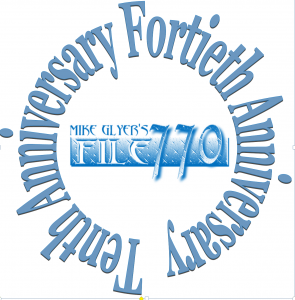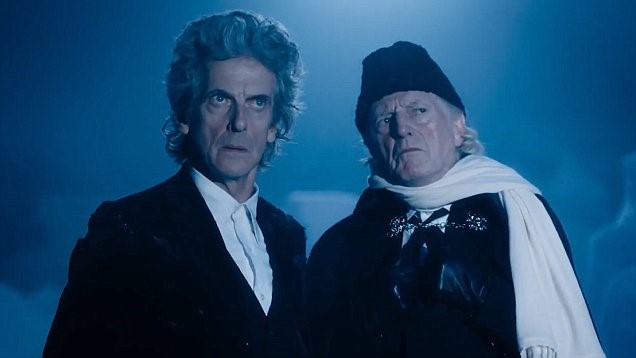The Doctor Who Christmas Special – Twice Upon A Time [BEWARE SPOILERS]
By Chris M. Barkley:
Twice Upon a Time, (****) with Peter Capaldi, David Bradley, Pearl Mackie, Mark Gattis, Matt Lucas, Nikki-Amuka Bird, Lily Travers and Jared Garfield. (Also featuring archival appearances by William Hartnell, Patrick Troughton, Anneke Wills and Michael Craze). Written by Steven Moffat, Directed by Rachel Talalay.
On Christmas Morning, 2017, I gave my True Love and Partner Juli, a Doctor Who/Bad Wolf T-shirt. After looking at it admiringly, she turned to me and said, “Wait a minute. Does this mean I’m Rose?”
I replied, “Well darling, after this evening, you can be The Doctor, too.”
 Twice Upon a Time, the thirteenth and latest of the Doctor Who Christmas Special episodes, was one of the monumental milestones in the series; a meeting between the first incarnation of the Doctor (David Bradley, channeling William Hartnell) and the thirteenth Doctor, played by Peter Capaldi.
Twice Upon a Time, the thirteenth and latest of the Doctor Who Christmas Special episodes, was one of the monumental milestones in the series; a meeting between the first incarnation of the Doctor (David Bradley, channeling William Hartnell) and the thirteenth Doctor, played by Peter Capaldi.
At the South Pole in 1986, The Doctor (Hartnell and Bradley), with the able assistance of his companions, Polly and Ben (Anneke Wills and Michael Craze) have vanquished the Cybermen for the first time. Feeling the oncoming effects of regeneration, the Doctors wanders from the safety of the station to seek refuge in his TARDIS…
In another time zone, The Doctor (Peter Capaldi), along with the able assistance of Bill (Pearl Mackie) and Nardole (Matt Lucas) have defeated the Cybermen (and TWO incarnations of the Master) from completely seizing a generational colony ship suspended just above a black hole. In the throes of another regeneration and separated from his companions, he enters his TARDIS and contemplates ending his life. But the TARDIS has other plans, as it pilots itself to a remote Antarctic base in 1986.
As the two Doctors contend with each other, they discover that time has completely stopped and a British army captain from World War One has suddenly appears before them, asking for the assistance of a doctor…
What makes a great television show? While there is no doubt that a good premise alone can propel show to some moderate success, the addition of compelling characters ensures it.
The Doctor and his (and soon to be her) various companions over the past fifty-five years have progressed from a “children’s show” to become icons of television.
Doctor Who has also had its share of controversies, too; the recent announcement that The Doctor would be played by Jodie Whittaker (The Night Watch, Tess of the D’Urbervilles and Black Mirror) under the direction of a new producer, Chris Chibnall (Torchwood, Camelot and Broadchurch) is the biggest in the show’s history.
Speaking only for myself, I welcome it! When you’ve gone as far and as long as Doctor Who, there is nothing more refreshing than shaking things up in a big way.
My personal history with Doctor Who began in the late 1960’s with non-canonical Peter Cushing films Doctor Who and the Daleks (1965) and Invasion Earth: 2150 AD (1966) which were played incessantly on Cincinnati’s brand new UHF station. Cushing, who was clearly riffing, but not openly imitating, William Hartnell’s Doctor, was, for me, a great introduction to his character. By the time Tom Baker’s episodes started airing in America in the mid-seventies, I had more an inkling of what Doctor Who was all about.
The ingenious thing about Twice Upon A Time is the manner in which the departing writer/producer Steven Moffat’s script blended William Hartnell’s last appearance as The Doctor (The Tenth Planet) with David Bradley’s turn as Hartnell’s Doctor and Peter Calpaldi’s swan song. Hartnell’s Doctor is well-played by Bradley, who, ironically enough, had previously played Hartnell the actor playing The Doctor in a 2013 BBC film, An Adventure in Time and Space.
(Please feel free to re-read the last paragraph as many times as you like before continuing.)
In the cliffhanger ending of the previous season’s last episode, The Doctor Falls, Capaldi’s Doctor is continuing to forestall an imminent regeneration in a suicide attempt. He is utterly confounded by his meeting his first self and is confounded by his state of mind back then (since each Time Lord’s meeting with their previous selves are automatically erased from their memories), contemplating the same thing.
The controversial point for some of the longtime fans is the frame of mind of Hartnell/Bradley’s Doctor. Some have criticized the story putting him fatalistic mood in The Tenth Planet serial, when he shows no outward signs of distress during the proceedings.
I have not seen The Tenth Planet. However, I want to point out several things that make this explanation perfectly acceptable to me, in the context of the events in Twice Upon a Time:
— William Hartnell’s health was in decline during the filming of these episodes. In fact, he was written out of the third episode altogether due to illness and the bulk of his story exposition was given over to his companion Ben instead.
— Hartnell, despite his condition, did not want to give up the role to Patrick Troughton. There were a few lines of dialogue cut from the broadcast towards the end of the final episode indicating that his character was having some emotional or physical trouble in the prelude to regeneration.
— The action of Twice Upon A Time takes place between the moments when The Doctor wanders away from Ben and Polly after the defeat of the Cybermen and his return to the TARDIS. The first Doctor is over 900 years old and has suffered through death of a companion, the departure of others and particularly, of his granddaughter Susan.
— Dramatically speaking, it makes sense that he may have been suffering through the mistakes, the horror and regrets during his first lifetime. His meeting with his twelfth (or thirtieth, if you count the War Doctor) and their subsequent adventure, gives both Doctors the hope and strength to carry on.
There were other lovely touches for Capaldi’s Doctor; Bill (Pearl Mackie) makes an extended appearance along with cameos from Nardole (Matt Lucas) and Clara (Jenna Coleman). And finally, Steven Moffat gives Peter Capladi grand and eloquent speeches, which are full of references of past Doctors: (See Radio Times’ article “Did you spot all the Doctor Who references in Peter Capaldi’s regeneration speech?”)
DOCTOR: Oh, there it is. Silly old universe. The more I save it the more it needs saving. It’s a treadmill.
Tardis noise
Yes, yes I know they’ll get it all wrong without me.
Tardis noise
Well, I suppose….one more lifetime won’t kill anyone. Well, except me.
Stirring music/Tardis noises
You wait a moment, Doctor. Let’s get it right. I’ve got a few things to say to you. Basic stuff first.
Never be cruel, never be cowardly. And never ever eat pears! Remember – hate is always foolish…and love, is always wise.
Always try, to be nice and never fail to be kind. Oh, and….and you mustn’t tell anyone your name. No-one would understand it anyway. Except….
He gasps, falls to the floor
Except….children. Children can hear it. Sometimes – if their hearts are in the right place, and the stars are too. Children can hear your name.
Gasps, grunts more
But nobody else. Nobody else. Ever.
Pulls himself off the floor
Laugh hard. Run fast. Be kind.
Stirring music.
Doctor – I let you go.
Regenerates
And on that dramatic note, Jody Whittaker’s Doctor appears…and promptly gets into trouble with her TARDIS. Another Doctor, another cliffhanger, just the way we LIKE IT!
Welcome aboard…
Discover more from File 770
Subscribe to get the latest posts to your email.



“Thirtieth, if you count the War Doctor”.
So, there are even more unknown regenerations out there?
And at Arisia last night a Who group was taking a “favorite Doctor” poll. Poor old War wasn’t even one of the choices.
The reason you haven’t seen the Tenth Planet is because it is not readily available. But I believe it did appear once on PBS a long time ago. No matter. Prior to that episode, the First Doctor (despite William Hartnell’s illness) showed no signs of failing or of despair. Keep in mind, that AT NO TIME prior to that episode was there ever a suggestion that the Doctor was not, as was at the time generally assumed, simply a human time traveller from the far future. (Hey, his granddaughter married a human.) There is an animated reconstruction of the episode. Yes the First Doctor got in the Tardis. We plainly see that the Doctor is not himself operating the Tardis. Polly and Ben are admitted to witness the ‘renewal’ as it was called. For a long time afterwards (I’l go look up specific episodes and the exact wording later) The Second Doctor complained of some other party having “changed his face”. He repeated those exact words, and seemed upset about it. The whole concept of Time Lord regeneration was retro-fitted into an episode that had simply intended to save the show when the lead appeared to be to ill to continue.I do not believe that it was intended to be more than a sort of self generating emergency plastic surgery (like a lizard regrowing its tail.) (Not that I object to them saving the show, or inventing regeneration.) But the point is there was never any indication of suicidal intent. Indeed, for many years, regeneration has been presented as a positive survival mechanism. (For Romana it was not just positive, but casual–she decided to change just for cosmetic reasons.) For the Doctor it was usually harder and the adjustment has often been difficult, but it’s always concluded with a sense of continuity. It’s only very recently that it’s turned into a death metaphor instead of a recovery/rebirth metaphor.
But I am delighted with the exit of Stephen Moffat and the rebirth of the new Doctor, be she 13th or 14th or Xth.